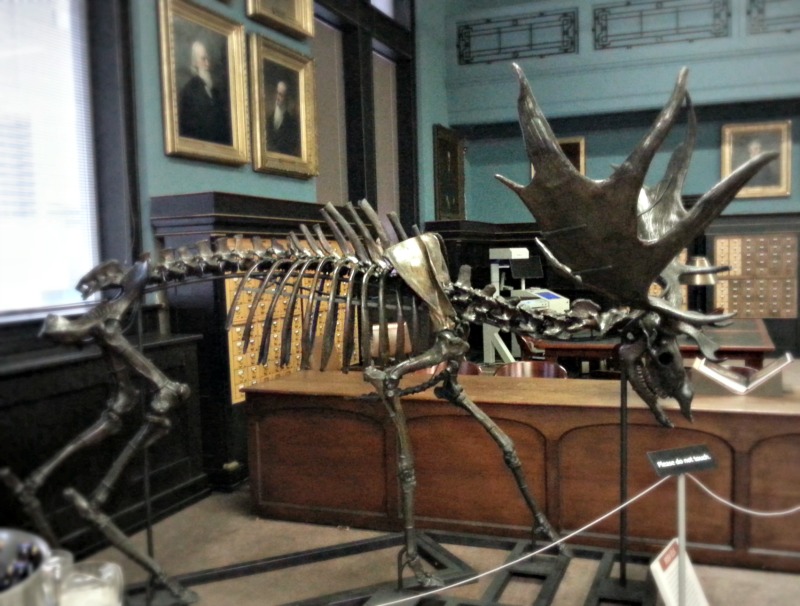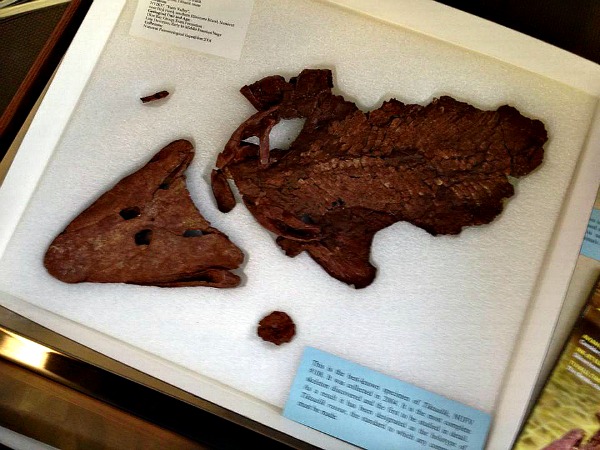
Fossil of Irish Elk, Academy of Natural Sciences, Philadelphia, PA.
We are approaching the ten-year anniversary of the events that set into motion the “modern day Scopes monkey trial,” the 2005 landmark intelligent design case of Kitzmiller v. Dover Area School District. On June 7, 2004, a parent by the name of Barrie Callahan had the temerity to ask why the school board had not approved a new biology text recommended by the science teachers. School board leaders responded with scorn and arrogance. They openly sneered that they would not approve a textbook that did not offer biblical creation science as an alternative to the scientific theory of evolution in 9th grade public school biology class.
We all know how that turned out. See Kitzmiller v. Dover Area School District, 400 F. Supp. 2d 707 (M.D.Pa. 2005) (permanently enjoining school board’s Intelligent Design policy).

That’s Barrie Callahan in the photo on the right, with me and noted climate scientist Richard Alley of Penn State, at an event Saturday night, April 26, 2014, in the library of the Academy of Natural Sciences in Philadelphia. The event was an awards dinner put on by the National Center for Science Education (NCSE), the science education watchdog group that provided the scientific backbone to the plaintiffs’ legal team in Kitzmiller. NCSE for many years focused primarily on promoting good science education relating to evolution, but more recently has decided also to focus on climate science, another area where science teaching has been attacked and undermined.
The NCSE throws one heck of a party. The spirit of friendship pervaded the library as scientists, lawyers, and other guests mingled for cocktails and dinner under portraits of scientists from the Academy’s history. On display were items from the Academy’s vast collection, such as the famous transitional fossil Tiktaalik, essentially a fish that lived 375 millions years ago with many features akin to those of four-legged animals, and the fossil of an Irish Elk (above), an extinct species of deer that roamed Eurasia but are called Irish because many fossils were found in Irish bogs.

Fossil of Tiktaalik, Academy of Natural Sciences, Philadelphia, PA
The NCSE gave “Friends of the Planet” awards to noted Penn State climate scientists: Richard Alley and Michael Mann.
Dr. Alley, a member of the National Academy of Sciences, played an important role in two recent newsworthy reports from the science community on the dire consequences expected from global warming unless immediate action is taken to reduce greenhouse gas emissions.
Dr. Mann, famous as the author of the hockey stick graph that demonstrated the dramatic rise in global temperatures corresponding with the rise in greenhouse gas emissions, has been attacked by climate science deniers.
With the help of his lawyer, Peter Fontaine of the Cozen O’Connor law firm, Dr. Mann recently won an important legal victory. The Supreme Court of Virginia on April 24, 2014, held that Dr. Mann’s correspondence as a former University of Virginia (UVA) faculty member “is exempt from disclosure under Virginia’s Freedom of Information Act (FOIA). The ruling is noteworthy because it strongly affirms the right of Virginia public university faculty and the institutions that employ them to conduct academic research in a zone of privacy, which protects ‘free thought and expression.’” Congratulations and thank you to Dr. Mann’s lawyers at Cozen who worked on that case pro bono.
The NCSE also gave a “Friend of the Planet” award to science journalist Faye Flam, who wrote the Planet of the Apes column for the Philadelphia Inquirer.
Also receiving awards were myself and my colleagues and friends Witold “Vic” Walczak of the ACLU, Eric Rothschild of Pepper Hamilton, and Richard Katskee formerly of Americans United for Separation of Church and State, now at Mayer Brown in DC, for our roles in Kitzmiller. We each received the “Friend of Darwin” award.
So where are we now ten years after Kitzmiller? Well, the case remains a touchstone. Philip Roth recently listed “science illiterates still fighting the Scopes trial” as one of a number of recent developments he doesn’t like. It’s nice to know that one of America’s greatest living novelists supports good science, because a lot of people don’t. Below is a photo I took on Easter Sunday 2014 at mile 266 of the Pennsylvania Turnpike.

Billboard at mile 266 of Pennsylvania Turnpike. Photograph taken April 20, 2014.
But evolution is no longer the main focus of uneducated attacks on science and scientists. The main attack today is directed at climate science. Dr. Mann and other scientists have been attacked for speaking out about their research on the existential problem of climate change. It has not stopped them from speaking out about the well established scientific facts. As a result, we now know the truth on climate change: it’s real, it’s serious, it will be disruptive and costly, but if we take strong steps soon there is much we can do to protect ourselves and, by the way, it will be very good for the economy as we move into new technologies.
So the takeaway is that evolution science and climate science share not only common ancestry but also a common design: to study the natural world and report on the findings for the advancement of knowledge and the betterment of humankind. The question is how society chooses to use scientific knowledge, ignore it or use it. On climate science, the argument for using and not ignoring it is so strong that it’s just a matter of time before our society makes the right choice. But it would be much better if we made that choice sooner rather than later.
So how does the Irish Elk fit in? Well, the most recent fossil is 7,900 years old, long before the dawn of civilization as we know it. The global climate has been relatively stable since then, but is now experiencing significant change. Because of climate change, many more species will go the way of the Irish Elk.
Written by -Steve Harvey

